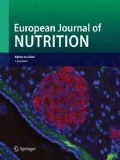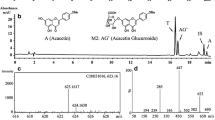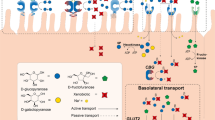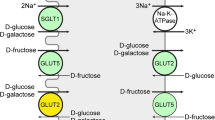Summary.
Background: Pharmacokinetic studies have shown that the small intestine is the major site of absorption for many flavonoid glucosides. Flavonoids are generally present as glycosylated forms in plants and foods, but there is increasing evidence that the forms reaching the systemic circulation are glucuronidated, sulphated and methylated derivatives. Hence, first-pass metabolism (small intestine-liver) appears to involve a critical deglycosylation step for which the mechanisms are not known. Aims: To explore the hypothesis that deglycosylation is a prerequisite to absorption and metabolism of dietary flavonoid glycosides, to identify the enzymes responsible, and relate their specificities with absorption kinetics. Methods: Flavonoid glycoside hydrolysing enzymes were isolated from samples of human small intestine and liver using chromatographic techniques. The proteins were characterised with respect to the cellular fraction with which they were associated, molecular weight, specificity for various substrates, and cross-reactions with antibodies. Cellular models were used to mimic the small intestine. Results: Protein extracts from human jejunal mucosa were highly efficient in hydrolysing flavonoid glycosides, consistent with an enterocyte-mediated deglycosylation process. Considerable inter-individual variation was observed [e. g. range, mean and standard deviation for rate of hydrolysis of quercetin-3-glucoside (n = 10) were 6.7–456, 96, and 134 nmol min−1 (mg protein)−1, respectively]. Two β-glucosidases with activity towards flavonoid glycosides were isolated from human small intestine mucosa: lactase-phlorizin hydrolase (LPH; localised to the apical membrane of small intestinal epithelial cells) and cytosolic β-glucosidase (CBG), indicating a role of human LPH and CBG from small intestine in flavonoid absorption and metabolism. Hydrolysis of flavonoid glycosides was only detected in cultured cells exhibiting β-glucosidase activity. Conclusions: The absorption of dietary flavonoid glycosides in humans involves a critical deglycosylation step that is mediated by epithelial β-glucosidases (LPH and CBG). The significant variation in β-glucosidase activity between individuals may be a factor determining variation in flavonoid bioavailability.
Similar content being viewed by others
Author information
Authors and Affiliations
Additional information
Received: 6 July 2002, Accepted: 24 October 2002
Current address: K. Németh, Department of Nutrition and Food Assessment, Faculty of Chemical and Food Technology, Slovak Technical University, Bratislava, Slovak Republic
Current address: G. Williamson, Nestec Ltd. Research Centre, Lausanne, Switzerland
Correspondence to: Dr. P. A. Kroon
Rights and permissions
About this article
Cite this article
Németh, K., Plumb, G., Berrin, JG. et al. Deglycosylation by small intestinal epithelial cell β-glucosidases is a critical step in the absorption and metabolism of dietary flavonoid glycosides in humans. Eur J Nutr 42, 29–42 (2003). https://doi.org/10.1007/s00394-003-0397-3
Issue Date:
DOI: https://doi.org/10.1007/s00394-003-0397-3




